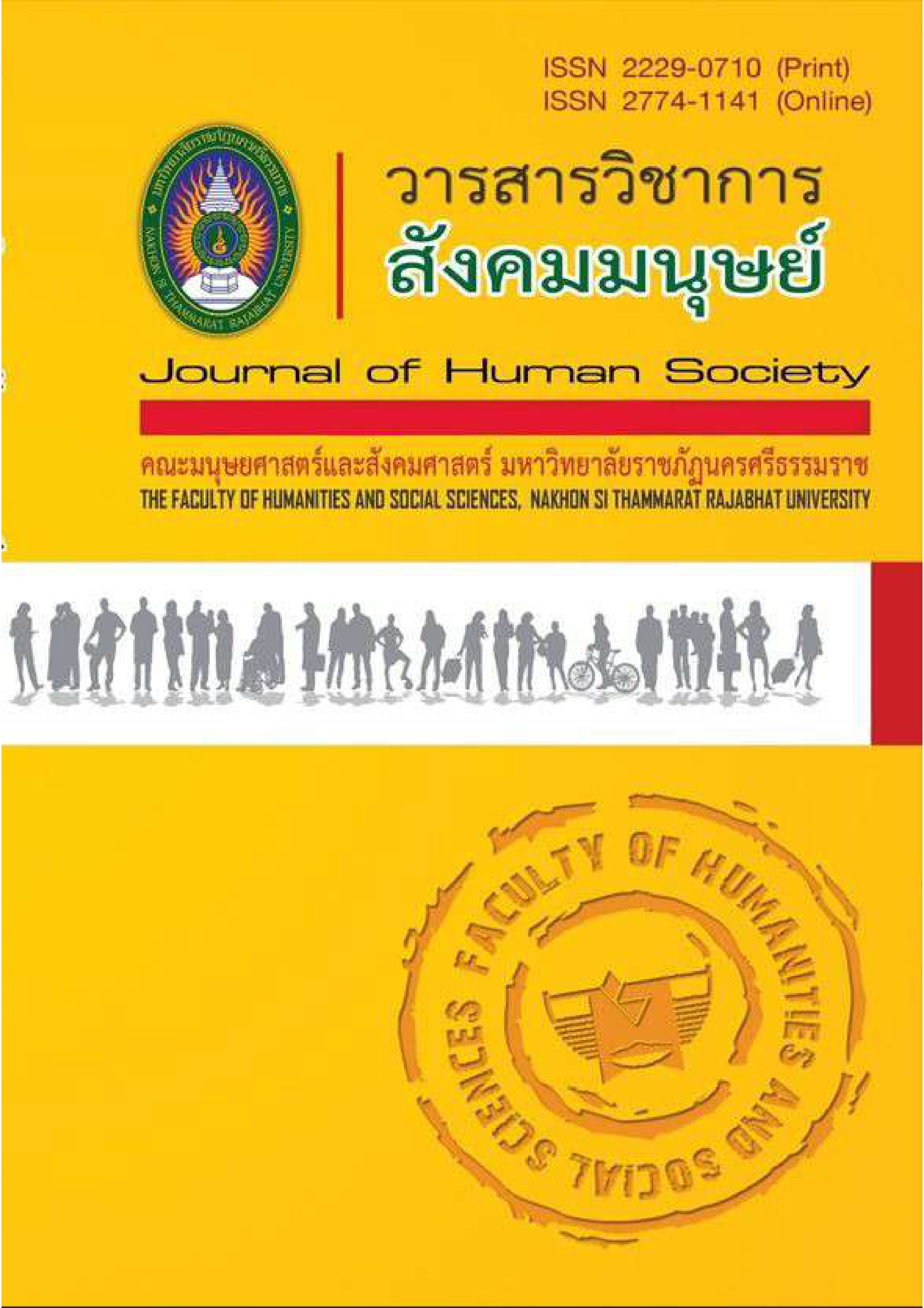Problems and needs of skill development for SME businesses in Chiang Rai in response to economic development in the Mekong sub-region countries
Main Article Content
Abstract
This research aims to study problems and needs of skill development for SME businesses in Chiang Rai in response to economic development in the Mekong sub-region countries. Mixed-method-research is used in this study based on a systematic approach to development strategies, including problem condition analysis (urgent problems, sequel problems, and target problems) from a population of 1,022. The 305 sample size was derived from the Yamane sampling methodology. The results showed that the initial potential of SME business workers in moral, ethical, and human relations have the highest scores (x̅ = 5.00 and 4.61), communication and information about products or services (x̅ = 4.33), practical skills (x̅ = 3.97), specific skills or expertise on products and services (x̅ = 4.48), and interest in seeking new knowledge (x̅ = 4.10). Opinions about issues that are important in developing professional skills, the sample groups focus on the issues in the following order. Theoretical content about professional fields was the most important (x̅ = 4.35) and followed by technique applied theory to practice that corresponds to the profession (x̅ = 4.34) with a statistical significance of 0.05 and a Cronbach's Alpha = .984. According to current condition of skill development for SME businesses in Chiang Rai in response to economic development in the Mekong sub-region countries, the sample had the opinions at the highest level on having their own professional knowledge (x̅ = 4.86), having personnel with sufficient professional knowledge (x̅ = 4.82), and being ready to transfer their professional knowledge (x̅ = 4.70).
For future needs on skill development for SME businesses in Chiang Rai in response to economic development in the Mekong sub-region countries, the sample group with the highest level of opinions consisted of receiving professional skills development budget support from the public or private sectors with an average (x̅ = 4.58), receiving enough materials and equipment to develop professional skills (x̅ = 4.55), the materials and equipment for skills development are in usable condition (x̅ = 4.56), having support for materials and equipment for developing skills from the public or private sector (x̅ = 4.57), having enough income from occupation (x̅ = 4.51), and having new marketing targets (x̅ = 4.55).
Article Details

This work is licensed under a Creative Commons Attribution-NonCommercial-NoDerivatives 4.0 International License.
บทความที่ได้รับการตีพิมพ์จะเป็นลิขสิทธิ์ของวารสารวิชาการสังคมมนุษย์
References
จิราภรณ์ พรหมเทพ. (2558). ความคาดหวังของผู้ประกอบการด้านการท่องเที่ยวในกลุ่มประเทศอนุภูมิภาคลุ่มน้ำโขงต่อคุณลักษณะของแรงงานในอุตสาหกรรมท่องเที่ยวและอุตสาหกรรมบริการในกลุ่มประเทศอนุภูมิภาคลุ่มน้ำโขง. SNRU Journal of Science and Technology 7(2) July – December (2015) 40-48.
บุญชม ศรีสะอาด. (2545). การวิจัยเบื้องต้น.ฉบับปรับปรุงใหม่.กรุงเทพฯ : สุวีริยาสาส์น.
ปิยบุตร ชลวิจารณ์. (2562). “แรงงานไทย” ในศตวรรษที่ 21: เรื่องเล่าขานของประเทศไทย. Forbesthailand.com.ออนไลน์. https://dlink.me/5cLaf.เข้าถึงเมื่อ 5 กุมภาพันธ์.2564.
ปรีชา อุปโยคิน และคณะ. (2558). การศึกษาความต้องการแรงงานและพัฒนาฝีมือแรงงาน ในอนุภูมิภาคลุ่มแม่น้ำโขง. MFU CONNEXION, 4(2) || page 43-64 .ปีที่ 4 ฉบับที่ 2 (กรกฏาคม – ธันวาคม 2558)
ศิรภัสสรศ์ วงศ์ทองดี. (2557). การพัฒนาทรัพยากรมนุษย์. กรุงเทพมหานคร. สำนักพิมพ์แห่งจุฬาลงกรณ์มหาวิทยาลัย.
สริญญา ลัทธิ์ถีระสุวรรณ. (2563). ปัจจัยสมรรถนะของผู้ประกอบการในภาคตะวันออกเฉียงเหนือของไทยที่มีผลต่อขีดความสามารถในการแข่งขันการค้ากับประเทศในอนุภูมิภาคลุ่มน้ำโขง. วารสารวิชาการบริหารธุรกิจ. ปีที่ 9 เล่มที่1 ประจำเดือน มกราคม – มิถุนายน 2563.หน้าที่ 174-195.
สำนักงานสถิติจังหวัดเชียงราย. (2564). ข้อมูลสถิติจำแนกตามสาขา. ออนไลน์.http://chiangrai.old.nso.go.th/nso/project/search_option/index.jsp?province_id=47. เข้าถึงเมื่อ 24 เมษายน 2564.
สำนักมาตรฐานการศึกษา. (2545). ชุดวิชาการวิจัยชุมชน.ชุดการเรียนรู้ด้วยตนเอง.สำนักมาตรฐานการศึกษา สำนักงานสภาสถาบันราชภัฏ กระทรวงศึกษาธิการ สำนักงานมาตรฐานอุดมศึกษา ทบวงมหาวิทยาลัย.นนทบุรี.เอส.อาร์.พริ้นติ้ง แมสโปรดักส์ จำกัด.
เสาวณี จันทะพงษ์และทศพล ต้องทุ้ย. (2563). เศรษฐกิจโลก เศรษฐกิจไทยหลังโควิด 19:โรคปฏิวัติโลก ยกเครื่องสู่อนาคตวิถีใหม่.BOT พระสยาม MAGAZINE ฉบับที่ 3 เดือนพฤษภาคม – มิถุนายน 2563.หน้าที่ 4-7.
อรวรรณ หอยจันทร์. (2562). สถานการณ์ช่วงชิงแรงงานทั่วโลกรุนแรง ไทยยังติดหล่มพัฒนา“แรงงานทักษะสูง”. Forbesthailand.com.ออนไลน์. https://dlink.me/gDrXa . เข้าถึงเมื่อ 5 กุมภาพันธ์ 2564.
อาภรณ์ ภู่วิทยพันธุ์. (2551). กลยุทธ์การพัฒนาทรัพยากรมนุษย์. กรุงเทพมหานคร.เอช อาร์ เซ็นเตอร์.
Anastasia Belyh. (2020). What is Career Development? This is How to Progress in YourJob.CLEVERISM Online. https://www.cleverism.com/what-is-career-development/.accessed on June 8, 2021.
BANGKOK INSIGHT. (2563). จำเป็นต้องรู้ “ถูกเลิกจ้างกะทันหันในช่วงวิกฤติโควิด-19 ค่าชดเชยที่ควรได้รับคือ?.ออนไลน์. https://dlink.me/A5uBO.เข้าถึงเมื่อ 5 กุมภาพันธ์ 2564.
Radhika Kapur. (2018). Career Development.Online. https://www.researchgate.net/publication/323808313_Career_Development. accessed on June 8, 2021.
Sung, Y., Turner, S. L., & Kaewchinda, M. (2013). Career development skills, outcomes, and hope among college students. Journal of career Development, 40(2), 127-145.
Walz, G. R. (1982). Career Development in Organizations. THE EDUCATIONAL RESOURCES INFORMATION CENTER (ERIC). The University of MichiganAnn Arbor, Michigan.


